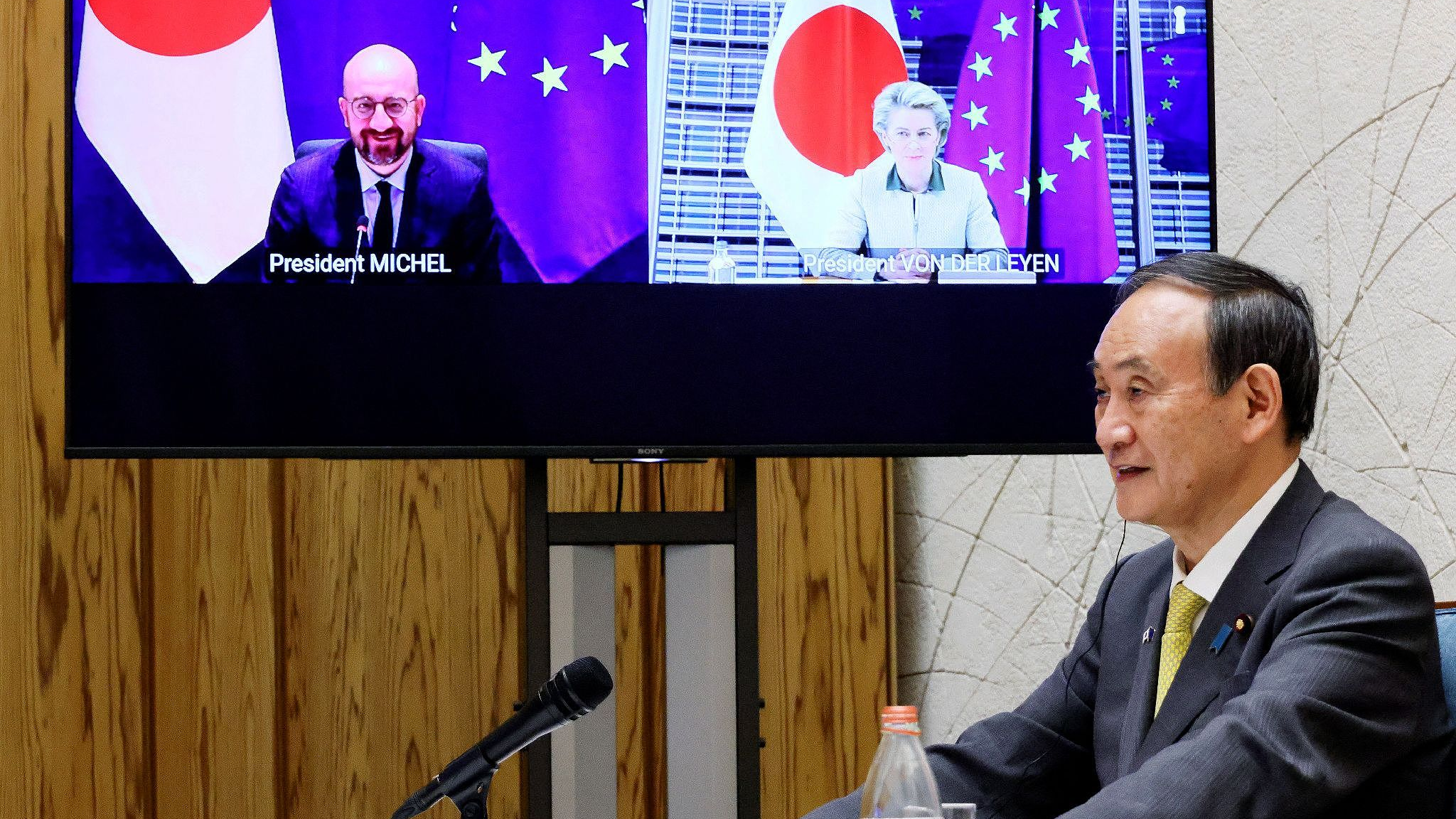
Japan's Prime Minister Yoshihide Suga (R) attends the EU-Japan videoconference summit with European Council President Charles Michel (L) and European Commission President Ursula von der Leyen (C) in Tokyo on May 27, 2021. /VCG
Japan's Prime Minister Yoshihide Suga (R) attends the EU-Japan videoconference summit with European Council President Charles Michel (L) and European Commission President Ursula von der Leyen (C) in Tokyo on May 27, 2021. /VCG
Editor's note: Hamzah Rifaat Hussain is a former visiting fellow of the Stimson Center in Washington, D.C., and serves as assistant research associate at the Islamabad Policy Research Institute (IPRI) in Pakistan. He specializes in conflict resolution dynamics and bilateral relations between states. The article reflects the author's opinions and not necessarily the views of CGTN.
The European Union (EU) and Japan issued a joint statement on May 27 at the 27th EU-Japan Summit which consists of four sections alongside annexures. It was issued by President of the European Council, Charles Michel, President of the European Commission Ursula von der Leyen, and the Prime Minister of Japan Yoshihide Suga.
The themes primarily focus on economic connectivity, dealing with COVID-19, and the promotion of a more stable, peaceful and democratic world order, yet goes a step further as Tokyo and Brussels made overt references to the South China Sea and China's internal issues which has less to do with the promotion of trade and securing peaceful orders and more about imperiling peace. There are no merits to such adventurism.
Paragraph 22 in the final section is where the flashpoint exists. Tokyo and Brussels have made an open reference to Hong Kong and Xinjiang Uygur Autonomous Region (Xinjiang) as "regional affairs" alongside quagmires in Afghanistan, Libya, the Palestinian territories and Syria. Equating Hong Kong and Xinjiang as regional affairs given that Afghanistan, Libya and Syria were met with military intervention and prolonged conflicts, is clear interference in China's internal affairs and a red line.
Additionally, Xinjiang, Hong Kong and Taiwan are not regional issues impacting the stability of the South China Sea as construed but internal ones. These clear distinctions have been blurred and were expectedly met with a sharp rebuke from the Chinese Mission to the European Union stating that the parties have gone completely beyond the norm of developing bilateral relations. Concepts of mutual respect for state sovereignty and non-interference are missing in the joint statement and on China alone; it is more about provocative politicking rather than charting out joint visions for a peaceful region.

Rain clouds loom over the U.S. aircraft carrier USS Ronald Reagan as it is anchored off Manila Bay, the Philippines, August 7, 2019. /AP
Rain clouds loom over the U.S. aircraft carrier USS Ronald Reagan as it is anchored off Manila Bay, the Philippines, August 7, 2019. /AP
Paradoxically and ironically, the very same paragraph also mentions that both sides will strive towards continued engagement with Russia and China. State-level engagement with Beijing or with Moscow entails a fundamental variable which is to respect territorial claims and internal dynamics where in China's case, Taiwan, Xinjiang and Hong Kong fall within the jurisdiction of the Chinese state and are non-negotiable.
Yet Brussels and Tokyo seem adamant in propping up such internal cases with the prospect of peace and stability as another sovereign state in the international system is targeted under the cloak of purportedly pursuing regional peace. Additionally, the importance and role of third parties will be harmed significantly as violations of state integrity while pursuing ideals of peace and prosperity do not correlate.
Then there are questions regarding EU-Japanese joint cooperation. What mechanisms will the EU and Japan explore to jointly counter China's stance in the South China Sea which the spokesman of the Chinese Mission stated are matters related to the territorial integrity and maritime rights of Beijing and brook no interference.
Would this entail increased military build-ups in the Taiwan Straits or urge military action on Xinjiang and Hong Kong? If yes, then principally this joint statement is not about safeguarding peace but imperiling it significantly by disturbing the deterrence equation with China given Beijing's sovereign right to respond with countermeasures including Coast Guard Laws which have been unfairly demonized.
The entire rationale of striving towards promoting a stable order with provocations is duplicitous. For example, while the joint statement in paragraph 18 affirms support to ASEAN unity as well as the ASEAN Outlook on the Indo Pacific region, by tapping into the Taiwan Straits and denigrating the nuanced understandings of ASEAN member states such as Malaysia, Singapore and the Philippines with regard to dealing with China, the EU and Japan are essentially aiming to shore up support to tackle Beijing in the South China Sea which lacks traction and is impractical. It was just days ago that Manila refused to be drawn into big power competition while dealing with China on issues bilaterally.
Yet this joint statement is at the expense of bilateralism and takes a direct aim at China by mentioning Hong Kong and Xinjiang as regional issues. The views expressed are that of a clear paradox- antagonizing another sovereign state while aiming for peace and stability globally. Japan had earlier been advised to be discreet on issues regarding the Diaoyu Islands and Taiwan. This joint statement with the EU mentioning China's internal issues goes a step further. Rest assured China will defend its security and national interests accordingly.
(If you want to contribute and have specific expertise, please contact us at opinions@cgtn.com.)

